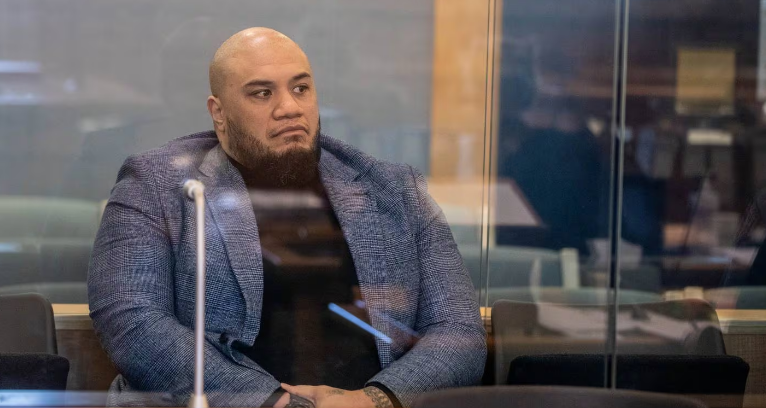
But Justice Sally Fitzgerald flatly rejected the suggestion this week as she sentenced Andew Lamositele-Brown, 40, to life imprisonment, describing the shooting as a fit of drunken, volatile aggression.
Jurors in the High Court at Auckland had also “clearly rejected” the claim, the judge noted, recalling the group’s unusually fast verdict at the trial’s end in October last year.
Lamositele-Brown, also known as Andrew Tovia Fepuleai, sat in the dock Thursday with his head bowed and an expressive frown for most of the hearing as Justice Fitzgerald determined the sentence, which includes a minimum term of imprisonment of 12 years and eight months before he can apply for parole.
The father-of-four appeared to briefly wipe away tears as the family of victim Petau Petau described how he was a single father who had fought for custody of his two children.
“My nieces don’t get to see their dad anymore because you took that away from them,” Petau’s sister said during a victim impact statement, describing her brother as the “comedian of the family” who had “a sense of humour like no other”.
“Everyone loved Petau,” she said.
Addressing the court in Samoan, the victim’s mother recalled the anguish of learning of her son’s death over what amounted to “undisciplined and disrespectful behaviour”.
“We forgive you, Andrew, but we can never forget that day or what happened,” the mother said in a statement that was later translated into English by her daughter. “God bless your children, Andrew, as well as the children of Petau.”
Petau had spent Christmas Day that year having a picnic at a local cemetery with his extended family - a way of including the memories of his late father and a recently deceased sibling in the day’s festivities.
Lamositele-Brown, meanwhile, had spent most of the day at his Flat Bush home either alone or with his infant son - drinking to excess as his partner and three other children visited relatives in Auckland.
It was the family’s first Christmas living in New Zealand in nearly a decade. He had been deported from Australia six months earlier, targeted for removal as a 501 because of his rank as president of the bikie gang’s Melbourne-based Darkside chapter.
The defendant and the victim exchanged some friendly texts early the next morning and Petau arrived at Lamositele-Brown’s Flat Bush, South Auckland home on his Harley-Davidson around 1am. The shooting that occurred a short time later was described by Crown prosecutor Chris Howard as “a completely unprovoked, needless killing of a defenceless victim”.
What prompted it remains in dispute, with Lamositele-Brown claiming on the witness stand that he was showing off a newly acquired pistol when it accidentally discharged and prosecutors suggesting he intentionally fired at Petau due to unfounded, drunken jealousy over his wife.
Defence lawyer Vivienne Feyen urged the judge to consider the killing a “reckless murder” rather than an intentional one, describing her client as having “expressed genuine and sincere grief for the loss of his friend”.
“Mr Lamisitele-Brown has never, ever denied that he is responsible for the death of his friend,” she added. “What he contested was the circumstances.”
In her own evaluation of the evidence, Justice Fitzgerald noted the understandable difficulty the defendant’s partner and two daughters had testifying against him at trial. She dismissed much of what they said in the witness box, adding that their initial statements to police on the night of the standoff - more damning to the defendant - were more believable.
Lamositele-Brown’s version of events, she added, was “wholly unpersuasive”. She said the shooting appeared to her to be “a somewhat impulsive and tragic” response to “some perceived slight against you”.
“Something triggered serious aggression in you shortly after he arrived.”
Fitzgerald emphasised that the shooting did not appear to be directly gang-related even though both men were associated with the Hells Angels. But the defendant’s illegal possession of a loaded semi-automatic pistol “was in some way related to your role in the gang”, she said.
She also noted the substantial amount of methamphetamine and $46,000 in cash that were found in the defendant’s house after the standoff, which she described as having the hallmarks of a commercial drug dealing enterprise. His minimum term of imprisonment was increased by 20 months to reflect the drug and firearms charges, which he pleaded guilty to six weeks before his murder trial.
The judge noted at the end of the hearing that Lamositele-Brown has since claimed to have cut ties with the Hells Angels.
“I sincerely hope that is the case,” she said. “Nothing good comes from being associated with a gang.”
As she said it, the entire front row of the courtroom gallery appeared to be filled with Hells Angels members - some of whom had sat quietly through the entire trial. However, the group appeared to be there in support of Petau’s family, with at least one member wearing a remembrance T-shirt for the victim.
Members declined to comment on the case as they gathered outside the courthouse after the sentencing.











